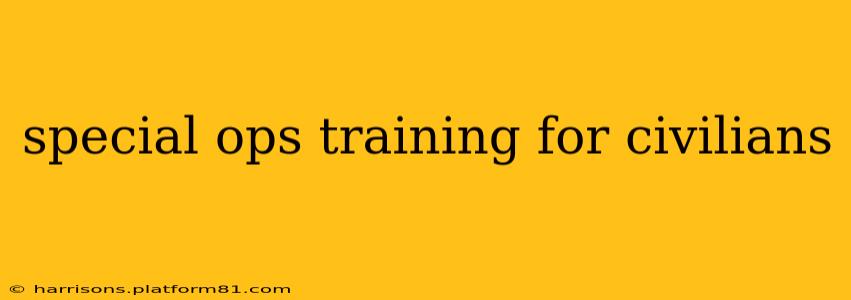The allure of special operations training is undeniable. The grit, the precision, the unwavering mental fortitude – these qualities captivate many civilians. While achieving the level of a Tier 1 operator is a monumental undertaking requiring years of dedicated service, civilians can certainly benefit from incorporating aspects of this rigorous training into their lives. This isn't about becoming a soldier, but rather about building resilience, physical prowess, and mental toughness applicable to various aspects of life.
This guide dives deep into what special ops training entails, focusing on aspects accessible to civilians, and debunks some common misconceptions. We'll explore physical fitness, essential skills, mental preparation, and resources to help you start your journey.
What Does Special Ops Training Involve?
Special operations training is intensely demanding, pushing individuals far beyond their perceived limits. It's not just about physical strength; it's a holistic approach encompassing physical conditioning, tactical skills, medical knowledge, and, crucially, mental resilience.
The Physical Component: Beyond the Gym
Forget the typical gym routine. Special ops training emphasizes functional fitness—the ability to perform tasks under duress. Think:
- High-Intensity Interval Training (HIIT): Short bursts of intense exercise followed by brief recovery periods. This mimics the unpredictable nature of real-world scenarios.
- Calisthenics: Bodyweight exercises like push-ups, pull-ups, squats, and dips build strength and endurance without relying on equipment.
- Endurance Training: Long runs, swims, and hikes build stamina and the ability to perform under fatigue.
- Strength Training: Focus on compound movements like deadlifts, squats, and presses to build overall strength and power.
Essential Skills: More Than Just Shooting
Special ops training extends far beyond physical prowess. Key skills include:
- Navigation: Map reading, compass use, and GPS skills are critical for operating in diverse environments.
- First Aid and Trauma Care: Advanced medical skills are paramount for self-sufficiency and team support in demanding situations.
- Survival Skills: Shelter building, fire starting, water purification, and foraging are crucial for survival in challenging conditions.
- Tactical Skills (with responsible application): While full-blown tactical combat training is generally not accessible to civilians, basic self-defense techniques and understanding situational awareness are valuable.
Is Special Ops Training Right for You?
Before embarking on this demanding path, consider the following:
Are you prepared for the intense physical and mental demands?
Special ops training requires unwavering dedication and a willingness to push your limits continuously. It's a grueling path that demands sacrifices.
Do you have access to appropriate training facilities and qualified instructors?
Proper guidance is crucial to avoid injuries and develop effective techniques.
Do you understand the ethical and legal implications of any tactical training you undertake?
Training must always be conducted responsibly and within the boundaries of the law.
What are the best ways to get started with special ops-style training?
Many civilians find benefit from focusing on specific aspects of Special Ops training. Instead of aiming for a complete replication of military programs, a more practical approach involves incorporating elements that align with personal goals.
What type of special ops training is best for civilians?
There's no single "best" type of training. The ideal approach depends on individual goals and interests. Focusing on fitness, survival skills, or self-defense allows for a more tailored and achievable program.
Are there any reputable civilian training programs modeled after special ops?
Many civilian fitness programs and survival schools incorporate aspects of special ops training. Research carefully, ensuring the program aligns with your goals and expertise level. Look for qualified instructors and a focus on safety.
How can I get fit enough for special ops training?
Start with a strong foundation in basic fitness. Gradually increase intensity and duration of workouts, incorporating HIIT, calisthenics, and endurance training. Focus on functional strength and building a high level of stamina.
What mental skills are important for special ops training?
Mental resilience is paramount. Develop self-discipline, stress management techniques, and the ability to remain calm under pressure. Consider mindfulness practices or working with a mental health professional.
In conclusion, while replicating the full scope of special operations training is unrealistic for civilians, incorporating its principles—especially the focus on fitness, resilience, and skill development—can significantly improve physical and mental well-being. Remember to prioritize safety, seek qualified instruction, and focus on aspects that align with your personal capabilities and goals.
